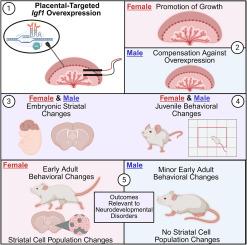Placental Igf1 overexpression sex-specifically impacts mouse placenta structure, altering offspring striatal development and behavior
IF 4.2
2区 医学
Q1 NEUROSCIENCES
引用次数: 0
Abstract
Insulin-like growth factor 1 (IGF1) is primarily produced in the placenta and is essential for neurodevelopment. Specifically, how placental IGF1 production persistently influences the brain is unclear, but with rates of complicated pregnancies on the rise, understanding placental contributions to child outcomes is paramount. We hypothesize that placental Igf1 expression alters fetal neurodevelopment relevant to neurodevelopmental disorders. Therefore, this study evaluated the effects of placental Igf1 overexpression on embryonic and postnatal brain development, particularly for striatum, a region highly linked to neurodevelopmental disorders. Placental overexpression altered placenta structure and function distinctly in females and males. Early differences in placental function altered the trajectory of striatal development, as adult females showed persistent changes in striatal cell composition and behavior while males were less affected. Overall, these results demonstrate that placental Igf1 expression alters striatal development and behavior relevant to neurodevelopmental disorders. These findings expand our understanding of placental influence on neurodevelopment and will aid in targeting placental biology in preventive interventions.

胎盘Igf1过表达性别特异性影响小鼠胎盘结构,改变后代纹状体发育和行为。
胰岛素样生长因子1 (IGF1)主要在胎盘中产生,对神经发育至关重要。具体来说,胎盘IGF1的产生如何持续影响大脑尚不清楚,但随着复杂妊娠率的上升,了解胎盘对儿童结局的贡献是至关重要的。我们假设胎盘Igf1的表达改变了与神经发育障碍相关的胎儿神经发育。因此,本研究评估了胎盘Igf1过表达对胚胎和出生后大脑发育的影响,特别是纹状体,一个与神经发育障碍高度相关的区域。胎盘过表达明显改变了女性和男性胎盘的结构和功能。胎盘功能的早期差异改变了纹状体的发育轨迹,成年雌性纹状体细胞组成和行为持续改变,而雄性受影响较小。总之,这些结果表明胎盘Igf1的表达改变纹状体的发育和与神经发育障碍相关的行为。这些发现扩大了我们对胎盘对神经发育影响的理解,并将有助于针对胎盘生物学进行预防性干预。
本文章由计算机程序翻译,如有差异,请以英文原文为准。
求助全文
约1分钟内获得全文
求助全文
来源期刊

Experimental Neurology
医学-神经科学
CiteScore
10.10
自引率
3.80%
发文量
258
审稿时长
42 days
期刊介绍:
Experimental Neurology, a Journal of Neuroscience Research, publishes original research in neuroscience with a particular emphasis on novel findings in neural development, regeneration, plasticity and transplantation. The journal has focused on research concerning basic mechanisms underlying neurological disorders.
 求助内容:
求助内容: 应助结果提醒方式:
应助结果提醒方式:


